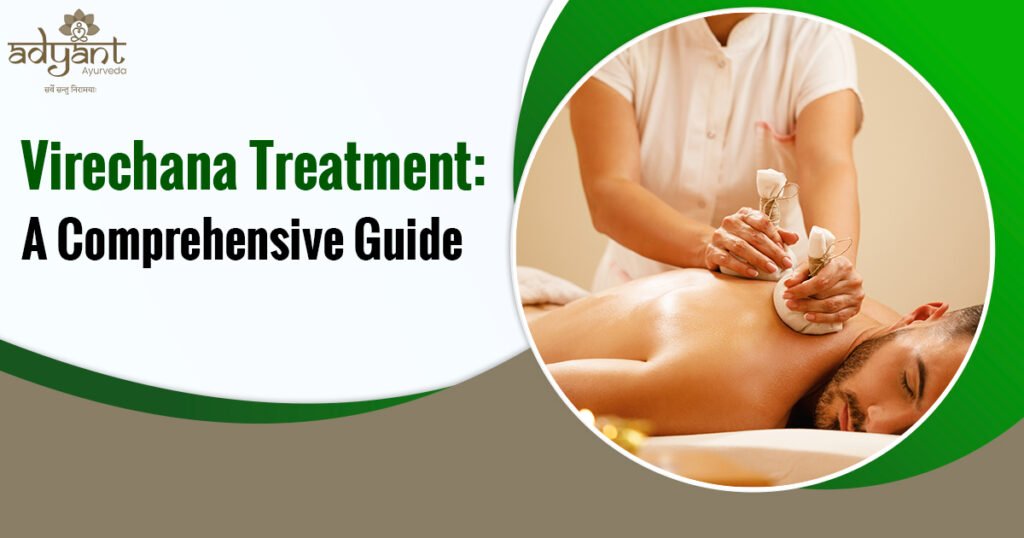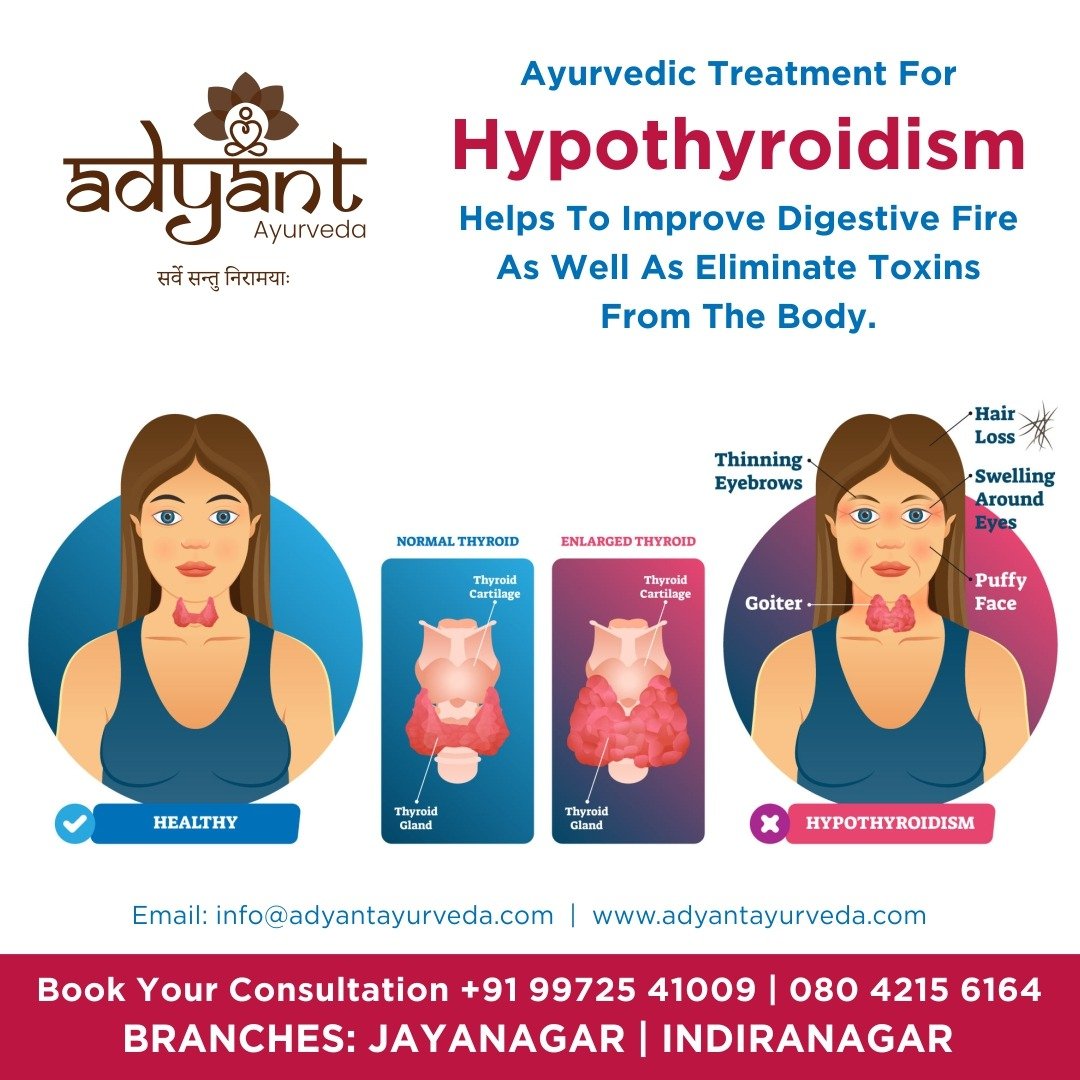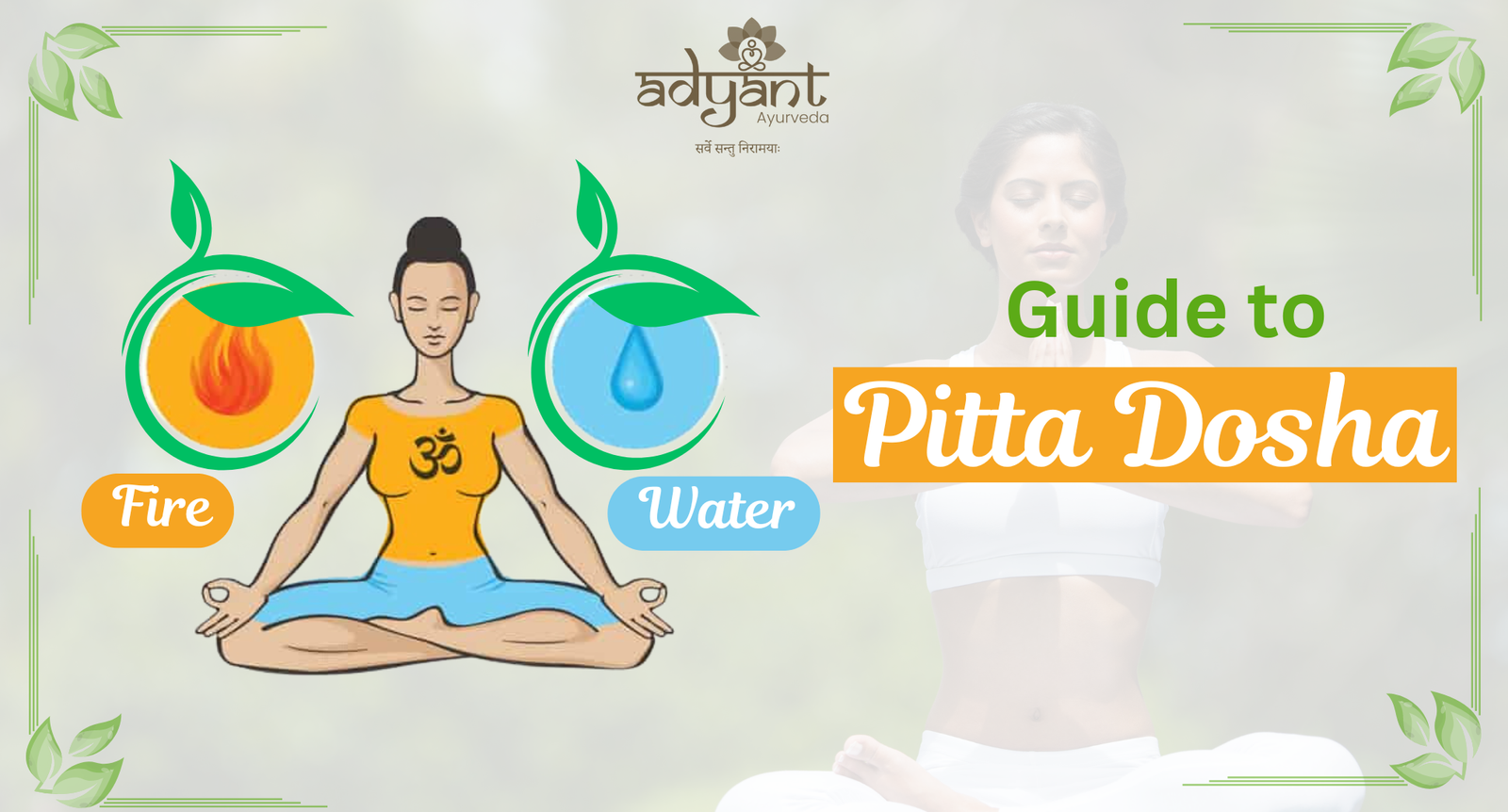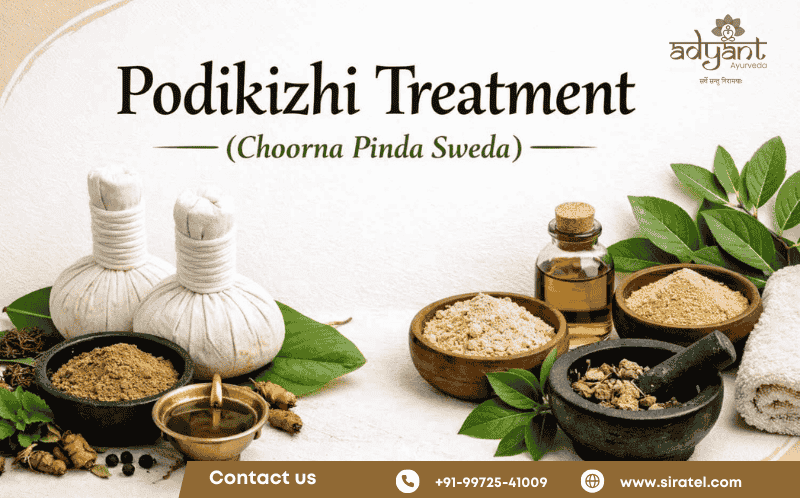Table of Contents
ToggleVirechana treatment in Bangalore is a classical Panchakarma detoxification therapy described in Ayurveda for eliminating excess Pitta dosha and accumulated metabolic toxins (Ama) from the body through controlled therapeutic purgation.
When performed under expert Ayurvedic supervision, Virechana supports digestive health, liver function, skin clarity, hormonal balance, gut cleansing, and overall metabolic detoxification.
At Adyant Ayurveda, Bangalore, Virechana Panchakarma treatment is conducted strictly as per classical Ayurvedic texts, with personalized medical assessment, proper preparation, continuous monitoring, and structured recovery care to ensure safety, effectiveness, and long-term results.
Medical Disclaimer
Virechana Panchakarma is a therapeutic Ayurvedic medical procedure. This content is intended for educational purposes only and does not replace personalized medical consultation. Treatment suitability, medicines, duration, and protocols vary based on individual health assessment by a qualified Ayurvedic physician.
What Is Virechana Panchakarma Treatment?
Virechana is one of the five primary Panchakarma purification therapies in Ayurveda. It is classified as Adho Shodhana Chikitsa, meaning downward cleansing therapy.
In Virechana:
Herbal purgative medicines are administered orally
These medicines induce controlled bowel evacuations
Excess Pitta dosha and accumulated toxins are eliminated through the lower gastrointestinal tract
Virechana Is NOT:
A laxative
An enema (Vasti)
A home detox or juice cleanse
Virechana is a doctor-guided Ayurvedic medical procedure that requires systematic preparation, supervision, and recovery protocol.
Classical Ayurvedic References for Virechana
Virechana therapy is extensively described in:
Charaka Samhita (Sutra Sthana & Kalpa Sthana)
Ashtanga Hridaya
Classical texts describe Virechana as the primary purification therapy for aggravated Pitta dosha, influencing:
Digestion and metabolism
Liver and blood purification
Skin and inflammatory conditions
Emotional and mental balance
Ayurveda emphasizes that Purvakarma (preparation) and Paschatkarma (recovery) are essential for safe and successful Virechana.
Virechana vs Laxatives vs Vasti (Important Difference)
Virechana:
Removes deep-seated Pitta toxins systemically from the liver, gut, blood, and tissues.
Laxatives:
Provide temporary constipation relief only, without systemic detoxification.
Vasti (Enema):
Primarily treats Vata dosha, not Pitta.
Virechana is a systemic detox therapy, not a bowel-cleansing shortcut.
Who Should Consider Virechana Treatment?
Virechana Panchakarma treatment is commonly advised for individuals with Pitta-dominant or toxin-related conditions, including:
Chronic acidity, gastritis, GERD
IBS, bloating, constipation
Fatty liver and sluggish metabolism
Acne, eczema, psoriasis, skin rashes
PCOD and hormonal imbalance
Migraine and stress-related disorders
Gout and inflammatory arthritis
Chronic fatigue and poor appetite
Doctor Evaluation Is Mandatory
An Ayurvedic physician evaluates:
Prakriti (body constitution)
Agni (digestive strength)
Age and lifestyle
Existing medical conditions
Current medications
before recommending Virechana.
Best Time for Virechana Treatment
According to Ayurveda:
Sharad Ritu (Autumn) is the most ideal season, as Pitta naturally aggravates during this time.
However, with proper medical supervision and preparation, Virechana can be performed safely throughout the year.
When Virechana Should Be Postponed (Timing-Based Considerations)
Virechana may be temporarily postponed if:
Digestive strength (Agni) is very weak
The patient is recovering from a recent illness or fever
There is extreme physical exhaustion or dehydration
Immediately after long travel, night shifts, or irregular sleep
The treating doctor decides the right timing for safe detoxification.
Mandatory Pre-Virechana Medical Evaluation
Before starting Virechana, every patient must undergo:
Detailed Ayurvedic consultation
Complete medical history review
Assessment of digestion (Agni), strength (Bala), and suitability
Necessary modifications for existing illnesses or medications
Self-selection or online booking without consultation is not recommended.
How Virechana Treatment Is Performed at Adyant Ayurveda
At Adyant Ayurveda, Virechana treatment in Bangalore follows a strict three-stage classical Panchakarma protocol.
1️⃣ Purvakarma – Preparation Phase
Snehapanam: Gradual intake of medicated ghee
Abhyanga & Swedana: Oil massage followed by herbal steam
This phase ensures:
Smooth detoxification
Reduced complications
Effective toxin mobilization
2️⃣ Virechana Karma – Main Detox Procedure
Herbal purgative medicines are administered orally
Controlled bowel movements under medical supervision
Continuous monitoring of hydration, vitals, and response
Detox adequacy assessed using classical parameters
What Patients May Experience:
Multiple bowel movements
Mild tiredness or lightness
Temporary appetite reduction
All responses are expected, temporary, and supervised.
3️⃣ Paschatkarma – Post-Treatment Recovery
Samsarjana Krama diet (stepwise digestive restoration)
Light, warm, easily digestible foods
Lifestyle and diet guidance
Skipping this phase may reduce long-term benefits.
Benefits of Virechana Panchakarma Treatment
When performed correctly, Virechana may offer:
Deep detoxification of the liver and gut
Improved digestion and metabolism
Clearer skin and reduced inflammation
Better hormonal balance
Relief from acidity and IBS symptoms
Reduced joint inflammation
Improved mental clarity and emotional balance
Enhanced energy and immunity
How Long Do Virechana Benefits Last?
Benefits may last several months when diet and lifestyle advice is followed
Chronic conditions may require repeat Panchakarma cycles
Results vary based on constitution, stress levels, and compliance
Can Virechana Be Combined With Other Ayurvedic Treatments?
Yes. Based on individual assessment, Virechana may be combined with:
Herbal medications
Rasayana therapy
Diet and lifestyle correction
Follow-up therapies such as Nasya or Vasti
All combinations are strictly doctor-planned.
Diet Guidelines During Virechana Treatment
Foods to Avoid
Fruits and fruit juices
Milk and dairy
Bakery and processed foods
Non-vegetarian food
Spicy, oily, fried items
Recommended Foods
Rice gruel (kanji)
Moong dal soup
Steamed vegetables
Warm water and herbal teas
Diet is personalized based on digestion.
Post-Virechana Do’s and Don’ts (Pathya & Apathya)
Avoid
Late nights, travel, heavy exercise
Stress and cold exposure
Follow
Proper sleep routine
Warm, freshly cooked meals
Calm daily schedule
Doctor-advised lifestyle
Is Virechana Treatment Safe?
Yes, when performed under qualified Ayurvedic supervision.
Not Recommended For:
Pregnant or lactating women
Severe weakness, dehydration, or underweight individuals
Acute infections or fever
Severe anemia
Active ulcers or GI bleeding
Recent surgery
Certain cardiac or renal conditions
Possible Temporary Effects
Mild weakness
Increased thirst
Loose stools (short duration)
Temporary appetite changes
⚠️ Never attempt Virechana at home.
Quick Eligibility Snapshot
✔ Suitable For
Pitta disorders
Digestive, skin, liver, and metabolic issues
✖ Not Suitable For
Pregnancy
Acute illness
Severe weakness
✔ Always Doctor-Supervised
Modern Health Perspective
From a contemporary health viewpoint, Virechana may support:
Gut motility and digestive balance
Liver detoxification pathways
Inflammatory regulation
Metabolic balance
when performed safely, ethically, and under supervision.
Why Choose Adyant Ayurveda for Virechana Treatment in Bangalore?
Experienced Ayurvedic doctors ( 28 + years of experience in Ayurveda )
Classical Panchakarma protocols
Personalized treatment planning
Hygienic therapy rooms
Ethical, evidence-aligned care
Multiple clinic locations across Bangalore ( Jayanagar, Indiranagar, Rajrajeshwari Nagar, Kalyan Nagar and Bannerghatta Road
Structured medical monitoring
Book your appointment at Adyant Ayurveda Bangalore
Virechana Panchakarma Treatment Cost in Bangalore
₹11,000 – ₹14,000
(cost varies based on duration, medicines, and preparation)
Conclusion
Virechana is a powerful Ayurvedic detox therapy when performed correctly, ethically, and under medical supervision. For authentic Virechana treatment in Bangalore, Adyant Ayurveda offers doctor-guided Panchakarma care rooted in classical wisdom and modern safety standards.
Author & Medical Review
Author:
Dr. Shreya, BAMS
Senior Ayurvedic Physician – Panchakarma & Digestive Disorders
Medically Reviewed By:
Dr. Shree Lakshmi, BAMS
28+ Years Experience in Ayurveda & Panchakarma
Last Medically Reviewed: 7th January 2026
FAQs Related to Virechana Panchakarma Treatment in Bangalore
What is Virechana treatment in Ayurveda?
Virechana is a classical Panchakarma detox therapy in Ayurveda that removes excess Pitta dosha and metabolic toxins (Ama) from the body through controlled therapeutic purgation under medical supervision.
Why is Virechana called a Panchakarma detox?
Virechana is one of the five primary Panchakarma purification therapies. It cleanses the liver, intestines, blood, and metabolic pathways, making it a deep internal detox—not a surface-level cleanse.
Who should opt for Virechana treatment?
Virechana is commonly advised for people with acidity, IBS, skin disorders, hormonal imbalance, fatty liver, migraine, inflammatory joint issues, and chronic digestive problems—only after doctor evaluation.
Is Virechana treatment safe?
Yes. Virechana is safe and effective when performed under a qualified Ayurvedic doctor’s supervision with proper preparation, monitoring, and post-treatment care.
How many days does Virechana Panchakarma take?
Virechana typically takes 3 to 7 days, including:
Preparation phase (Purvakarma)
Main detox day
Post-treatment recovery (Paschatkarma)
Duration varies based on individual health.
Is Virechana painful or uncomfortable?
No. Virechana is not painful. Patients may experience multiple bowel movements, mild tiredness, or lightness on the detox day, which are expected and temporary.
What diet should be followed during Virechana?
A light, warm, easily digestible diet is followed, including:
Rice gruel (kanji)
Moong dal soup
Steamed vegetables
Diet is strictly personalized based on digestive strength.
What precautions are needed after Virechana?
After Virechana, patients should avoid heavy exercise, late nights, travel, cold exposure, and stress. Following doctor-advised Pathya (do’s) and Apathya (don’ts) is essential to maintain results.
Can Virechana help with skin and hormonal problems?
Yes. By removing excess Pitta and toxins, Virechana may support:
Clearer skin
Reduced inflammation
Better hormonal balance
Results depend on individual health and lifestyle compliance.
How often can Virechana be done?
Virechana is generally recommended once or twice a year, or as advised by an Ayurvedic physician based on disease condition and strength.
What is the cost of Virechana treatment in Bangalore?
The cost of Virechana treatment in Bangalore at Adyant Ayurveda usually ranges between
₹11,000 – ₹14,000, depending on treatment duration, medicines, and preparation procedures.
Is Virechana suitable for everyone?
No. Virechana is not recommended for pregnant women, severely weak individuals, active infections, severe anemia, recent surgery cases, or certain cardiac and renal conditions.
Can Virechana be done at home?
No. Virechana should never be done at home. Improper purgation without medical supervision can cause dehydration and complications.
Why choose Adyant Ayurveda for Virechana treatment in Bangalore?
Adyant Ayurveda offers:
Experienced BAMS doctors
Classical Panchakarma protocols
Personalized treatment plans
Structured monitoring
Multiple Bangalore locations
ensuring safe, ethical, and authentic Virechana therapy.









